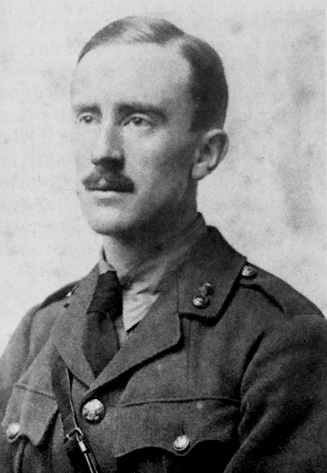
This post discusses the film Tolkien. I don’t think there is anything in this film to spoil, given that it depicts events from a century ago, but consider yourself advised.
Tolkien, a biographical film about author and philologist J. R. R. Tolkien, is admittedly a stretch from my usual science-themed fare. But when I realized the advertising of the film underplayed its focus on the early days of Tolkien’s scholarly career, I figured I should bring it to the attention of this community. Consider it the inverse of Avengers: Endgame; a film I suspect most Emerging Scholars will want to see even if relatively few moviegoers do. I expected something like a cross between War Horse and Shakespeare in Love, an on-the-nose tour of WWI and the elements of Middle Earth Tolkien drew from it; what I got was more of a spiritual sequel (prequel?) to Dead Poets Society.
To be sure, the movie is interested in Tolkien’s inspirations for The Hobbit and The Lord of the Rings. And it does spend some time with Tolkien on the Western Front, in the presence of a loyal companion not miles away from Samwise Gamgee. Overall, however, the movie avoids overt, one-to-one connections. We could have easily been introduced to a grizzled veteran from The Rangers (a volunteer unit of the British Army that was present at the Battle of the Somme), maybe even played by Viggo Mortensen in the cheekiest of all possible worlds. Tolkien’s philology mentor could have been portrayed with a pipe-smoking habit and a penchant for starting class precisely when he meant to. And so on. In the place of such cutesiness, we visit the opera hall for a Wagner performance, with just enough plot summary to help anyone unfamiliar with Das Rheingold grasp the influence and well short of Tolkien crying “Aha!” and dashing home for his quill. The film is confident that genuine cultural antecedents are more than enough to give the famous fantasy novels an origin story.
One possible exception is the influence of Catholicism and Tolkien’s faith. Religion is present in the film, mainly in the form of Father Francis Morgan, Tolkien and his brother’s guardian after the death of their mother. He is depicted as stern yet caring, genuinely desiring the best for his wards but sometimes at odds with them about what is best. If I recall correctly, the only time the religion of Tolkien himself comes up is a chapel sequence in which he is notably alone in his reluctance to sing the hymn (possibly for the circumstances of the moment). A charitable reading would be that the film is content to let Tolkien’s well-known belief speak for itself. At the same time, a Tolkien novice could be forgiven for coming away with the impression that Tolkien had little to do with the Church, perhaps because he was an intellectual.
That scholarship, by contrast, is front and center. The journey from school boy to university student to academic provides the film its narrative arc. Those who see parallels between Frodo’s quest and their own scholarly experience will likely appreciate having the allegory brought full circle. Many of you might sympathize with Tolkien’s difficulties on an entrance exam, or his worries about securing a scholarship. You might recognize the challenges of balancing academics and a personal life,
or the joy of finding an advisor who shares your passion and can bring out your best work. And so regardless of your interest in Tolkien himself or how much this film adds to your understanding of his life, you may enjoy walking alongside him on a scholarly journey.
Make sure to check out yesterday’s announcement of a webinar this Saturday featuring David and Kate Vosburg, authors of Jesus, Beginnings, and Science. If this post left you short on science & faith content for the week, I’m sure there will be plenty to chat about on the webinar.
Andy has worn many hats in his life. He knows this is a dreadfully clichéd notion, but since it is also literally true he uses it anyway. Among his current metaphorical hats: husband of one wife, father of two teenagers, reader of science fiction and science fact, enthusiast of contemporary symphonic music, and chief science officer. Previous metaphorical hats include: comp bio postdoc, molecular biology grad student, InterVarsity chapter president (that one came with a literal hat), music store clerk, house painter, and mosquito trapper. Among his more unique literal hats: British bobby, captain’s hats (of varying levels of authenticity) of several specific vessels, a deerstalker from 221B Baker St, and a railroad engineer’s cap. His monthly Science in Review is drawn from his weekly Science Corner posts — Wednesdays, 8am (Eastern) on the Emerging Scholars Network Blog. His book Faith across the Multiverse is available from Hendrickson.

Leave a Reply